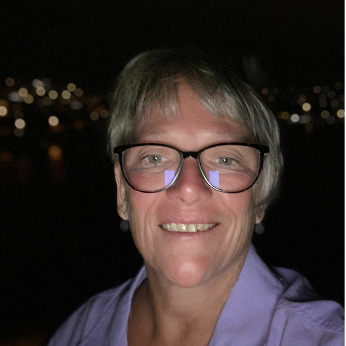 By Liz Moore
By Liz Moore
I hadn't been feeling well in December of 2021. My family physician was not taking me seriously, so my husband intervened. He insisted on a full work up with all of the necessary tests. I don't know where I would be if my husband had not stepped in when he did. Tests were ordered and a mammogram was scheduled but not until March of 2022.
When I went for my mammogram, the way the technician was asking questions started to give me the suspicion that something was up. I wasn't surprised when I got a call back for further testing with an ultrasound. When I got the call that I needed a biopsy, I think that is when I knew deep down it was something of concern and I felt like it might be cancer. I waited for the reports to be posted and looked at the images. I educated myself on what the written report with its medical terms meant. I educated myself on the BI-RADS scale (the Breast Imaging Reporting and Data System that healthcare providers use to describe the results of a mammogram) and what my number likely meant. It was a 4, and that is the highest number they can give without a pathology report. I read about the mass and how it was "spiculated" in appearance, which means that it has spikes on the surface of the tissue. In my heart I knew I had breast cancer even before I met with the surgeon.
On April 12, 2022, I received the official diagnosis from the surgeon: stage II invasive carcinoma. I did not hesitate and decided on a double mastectomy because in 2015, I had undergone a lumpectomy in my other breast for calcifications, but there was no cancer at that time. With that knowledge I realized my breasts were not healthy and needed to go! It was such an emotional and scary time for me.
I was fortunate I did not have to wait long; May 4, 2022, was my surgery date and it changed my life. I came through the surgery with flying colours. I took a month to recuperate and then got back to my life as if nothing had really happened. I got back to golfing five days a week and working my part time job. I did not require chemotherapy or radiation, so I was riding that high all summer long. I kept telling myself, "I got off easy compared to other women". The summer came and went and so did the high. The winter hit and so did my emotional crash. My world felt like it was crashing down upon me. The realization of what I had gone through that past May had me reeling.
The most difficult side effects have been the emotional ups and downs and sometimes you feel nothing at all. In some respects, the days that I don't feel anything are the most troublesome for me. I take the hormone blocker Arimidex daily and the side effects from that drug have not been pleasant. I’ve gained weight, and an increase in cholesterol means I have to take a statin (medication used to help lower my cholesterol). It also causes body pain that can be really hard to navigate at times. I have tried to live a "flat life" as the nerve pain I have makes wearing prosthetics very painful. I have received comments and questions asking things like, ‘Why I don't wear them?’, ‘Don't I want to look like other women?’ and ‘Don't I want to look normal?’ Those have been the hardest things to hear and deal with.
I keep telling myself everyday when I wake up that it’s another day I get to be here and to be with my family and friends. It's another day I get to participate in the things I love to do. Whether it is golf when the weather allows or going for walks with my dog, I am here!
There are, however, days when I can't seem to reconcile my diagnosis and losing my breasts. Every day I feel the pain in my incisions and it's a constant reminder. It never really leaves your thoughts that you had breast cancer, along with the thought of recurrence. I have struggled with my faith. I have wrestled with “how does this all fit in” and “what shall I do with it all” going forward. I am the type of person that always wants to take an unfortunate situation and turn it into something that can help someone else in some way. It is hard for my children and my extended family and friends to really understand what I have gone through. Those who have stayed with me through this journey (I did have friends and extended family walk away), have tried to support me the best way they knew. It just wasn't helpful unfortunately.
My husband had the best understanding of cancer as he is on his own journey of being treated for lymphoma. There are days where I feel so full of gratitude and happy to be alive, Then there are some days where I want to hide away from the world because I feel like a freak for not wearing prosthetics. Sometimes it's exhausting swimming against the current. I have to work at staying positive, being hopeful and remove the worry from the forefront of my thoughts. A good therapist helps me.
The biggest impact breast cancer has had for me is that for the most part people don't really want to talk about it. I feel in a lot of ways it's not a topic that is ever open for discussion. It's very isolating. There are not a lot of free resources as far as groups or therapy goes which is disappointing. There needs to be more support for women and men who are going through or have gone through a diagnosis.






